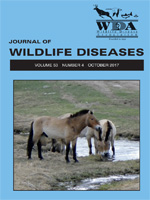American black bears (Ursus americanus) are commonly infested with ticks throughout their range, but there are few surveys for tick-borne disease agents in bears. To characterize tick infestations and determine the prevalence of current infection with Babesia spp. and past or current infection with Ehrlichia spp. in newly re-established populations of black bears in east central and southeastern Oklahoma, US, we identified adult (n=1,048) and immature (n=107) ticks recovered from bears (n=62). We evaluated serum and whole blood samples from a subset (n=49) for antibodies reactive to, and characteristic DNA fragments of, Ehrlichia spp., as well as characteristic DNA fragments of Babesia spp. Amblyomma americanum, the most common tick identified, was found on a majority (56/62; 90%) of bears and accounted for 697/1,048 (66.5%) of all ticks recovered. Other ticks included Dermacentor variabilis (338/1,048; 32.3%) from 36 bears, Amblyomma maculatum (9/1,048; 0.9%) from three bears, and Ixodes scapularis (4/1,048; 0.4%) from three bears. Antibodies reactive to Ehrlichia spp. were detected in every bear tested (49/49; 100%); maximum inverse titers to Ehrlichia chaffeensis ranged from 64–4,096 (geometric mean titer 1,525). However, PCR failed to identify active infection with E. chaffeensis, Ehrlichia ewingii, or an Ehrlichia ruminantium-like agent. Infection with Babesia spp. was detected by PCR in 3/49 (6%) bears. Together these data confirm that tick infestations and infection with tick-borne disease agents are common in bears in the southern US. The significance of these infestations and infections to the health of bears, if any, and the identity of the Ehrlichia spp. responsible for the antibody reactivity seen, warrant further evaluation.
How to translate text using browser tools
1 October 2017
PREVALENCE OF BABESIA SPP., EHRLICHIA SPP., AND TICK INFESTATIONS IN OKLAHOMA BLACK BEARS (URSUS AMERICANUS)
Delaina Skinner,
Jessica R. Mitcham,
Lindsay A. Starkey,
Bruce H. Noden,
W. Sue Fairbanks,
Susan E. Little
ACCESS THE FULL ARTICLE

Journal of Wildlife Diseases
Vol. 53 • No. 4
October 2017
Vol. 53 • No. 4
October 2017
Babesia spp.
black bear
Ehrlichia spp.
tick
Ursus americanus




